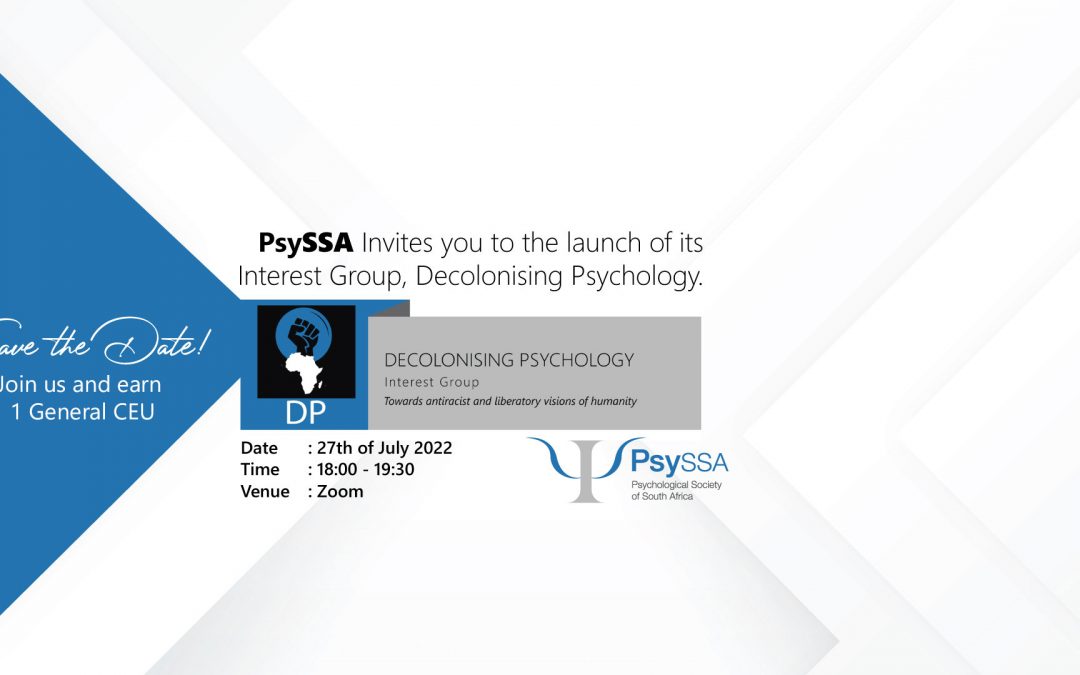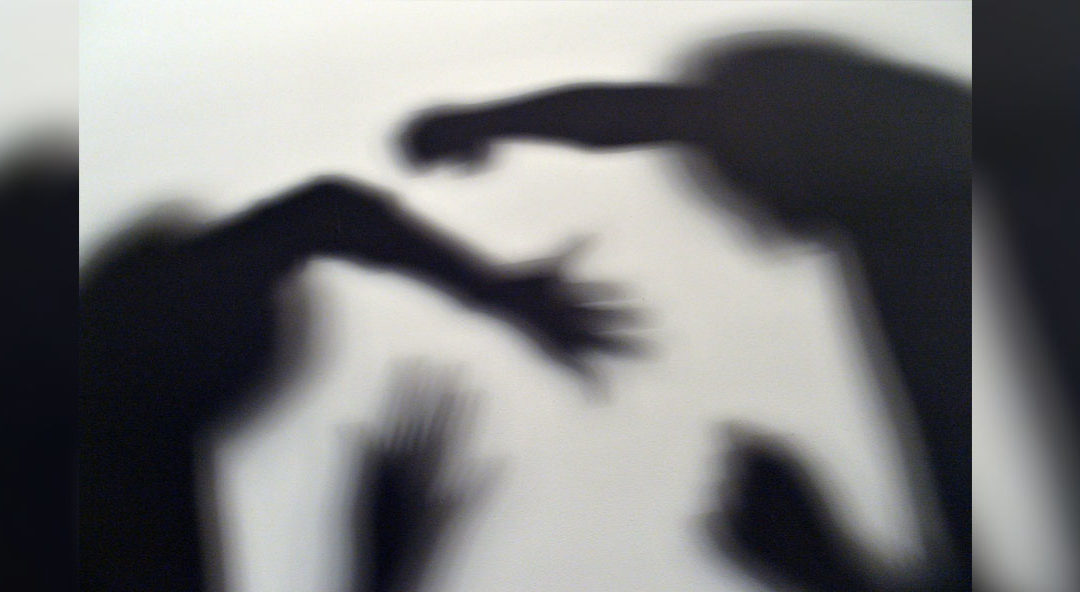
Invitation: Launch of Decolonising Psychology Interest Group, 27 July 2022
PsySSA invites you to the launch of its new Interest Group, Decolonising Psychology, and earn 1 General CEU!

PsySSA invites you to the launch of its new Interest Group, Decolonising Psychology, and earn 1 General CEU!


Floretta Boonzaier, Melanie Judge, Peace Kiguwa and Chris McLachlan[1]
In reflecting on the significance of an International Day for the Elimination of Violence against Women, it is important that we reflect on several facets of violence that continue to affect how we respond. The sites of violence are multiple and intersecting and raise important questions about our history, the state, and our everyday intimate lives and relationships. To this end, it is important that we consider: the connections between violence and broader social and political structures as well as the intimate re/productions of identities in and through violence. South African society remains fraught with complex manifestations of violence that reflect the country’s complex history of violence. This socio-history is also a reflection of entrenched and continuing social, political, and economic inequalities that make expressions of violence wide-ranging. Part of our task, therefore, is a concerted effort at understanding how violence manifests. This must include an exploration of the embodied subjects that are implicated in violence, such as a critical exploration of toxic masculinities that are often part of violent behaviour. It should also include critical attention to the interconnecting matrix within which violence is enacted. This matrix includes the interpersonal, structural, collective, embodied and affective transmissions and expressions of violence.
Understandings of, and responses to, violence in South Africa need to consider the historical context in which lives were lived and governed through violence during slavery, colonialism and apartheid. Hierarchies of difference based on racial inequalities were produced through violent means. Similarly, sex, sexuality and gender were violently controlled in the past, and the heterosexualisation of society was key to colonial rule. Today we see how these histories of racialised violence manifest. The synonymisation of violence with blackness (and, by extension, non-violence with whiteness) is one such manifestation. Another is the conditions of inequality (related to intersecting dynamics of race, gender and class) faced by black women and queer people, rendering them disproportionately vulnerable to violence. The slow violence of poverty compounds this picture.
Language upholds and permits particular normative ideas about gender and sexuality and must be challenged in the current context where we are, yet again, drawing attention to violence against womxn in South Africa. Amidst the outcry against violence against womxn and gender non-conforming persons we see language being used that contributes to a context in which violence against womxn is normalized and potentially made legible in a particular way. Calls to ‘protect our women and children’ that we continue to hear are problematic in terms of how they position womxn relative to men. Who should do the protecting? Who is in need of protection? This protectionist discourse draws on paternalistic and patriarchal ideas surrounding womxn’s place in society, and making that equivalent to children. Womxn are not asking to be protected. They are asserting their right to live lives free from violence and for the equality promised in the constitution. Language is intimately connected to power – to ideas that we hold about who holds the power in society and who the powerless are. Language can work to bolster those in power and further dehumanize those who continue to struggle for recognition and dignity.
Finally, in reflecting on re/productions of violence against marginalised members of a community, it is important to consider how different bodies remain on the margins and are differently made vulnerable to violence. For example, when the community stands up against GBV and calls for action, accounts that are often side-lined from the trans and gender-diverse community persist. Cis-privilege, long with heteronormativity, is also found in our trauma centres. In particular, trans and gender-diverse people often stay silent as they fear further abuse when they reach out for support. Their bodies are gazed upon and ‘othered’. They find themselves being queried by healthcare providers and at times even laughed at when they approach the police. As trans, queer and gender-diverse GBV survivors they are re-traumatised by the system. Statistically trans, queer and gender-diverse people are at a higher risk than cisgender people to experience sexual assault. As a vulnerable group of people our responsibility is to advocate that rape-crises centres, police stations and courts become safe and easily accessible spaces. And when we call for action against GBV we also include not only people that are both sexually and gender diverse.
Historical differentiations between self and other, and the appetite for othering and discrimination it institutionalised, are reflected in how we, as a society, continue to wield difference and power in ways that oppress ‘the other’. For as long as difference is hinged to structural inequality, and that inequality aligns with people’s racialised and gendered locations in society, violence will continue to be a primary means of (dis)engaging with one another – and ultimately with ourselves.
[1] Authors write in their capacity as members of the Sexuality and Gender Division of PSYSSA (Psychology Society of South Africa)

Over and above PsySSA’s comprehensive list of membership benefits, in 2020, PsySSA members will receive free access to the Mental Health Matters Magazine which is a distinctive high quality Journal for health care professionals; free access to PsySSA’s online MyCPD platform with new opportunities to obtain CEU points and free listing and regular referrals through the recently renovated PsySSA Directory of Psychology Professionals. If that’s not enough, PsySSA members will be eligible for attractive discounts for PsySSA’s highly anticipated 26th Annual Psychology Congress.

The PsySSA Student Division hosted its third annual Mentorship Programme Awards Ceremony at the PsySSA Offices tonight, 14 November 2019.
The Mentorship Programme was established in 2017 by current Chairperson, Mr Muhammed Yaeesh Cassim. It has been accredited by SAQA at an NQF level 5.
The Mentorship Programme aims to provide students with an opportunity to enhance their academic writing skills whilst exposing students to various domains within the field of psychology. The programme seeks to encourage a holistic understanding of psychological perspectives, with particular emphasis on the African narrative. It is currently the only nationally run Mentorship Programme, being hosted in Gauteng, Kwa-Zulu Natal and the Western Cape. To date, the programme hosts over fifty students. Furthermore, the mentorship team is proud to announce that in 2020, the programme will extend its reach to the Free State and Limpopo.
Congratulations to the mentees for successfully completing our Mentorship Programme. The following Provincial Awards were achieved by Gauteng:
The Mentorship Programme is entirely voluntary, and we appreciate every hour the participants have dedicated. Gauteng won two national awards:
Special Thanks to:
PsySSA President, Professor Garth Stevens, for attending the awards and for his address on ‘Experiences of Mentoring’.
PsySSA Executive Director, Ms Fatima Seedat, for attending the awards and presenting the provincial awards
2018 Mentee of the Year, Ms Matshepo Setlaleleng, for her address.